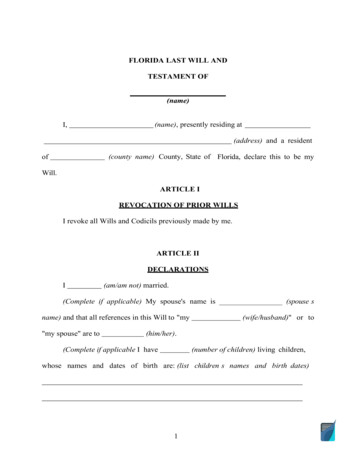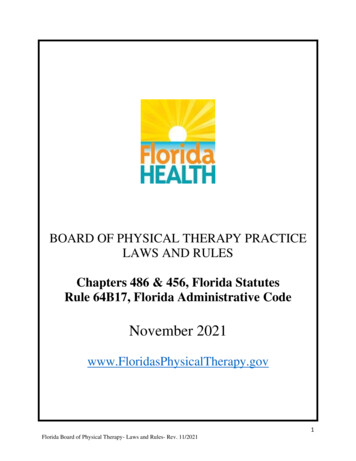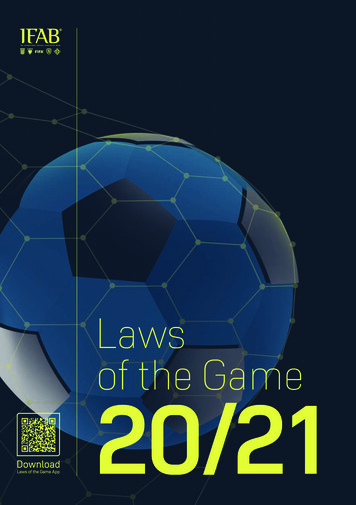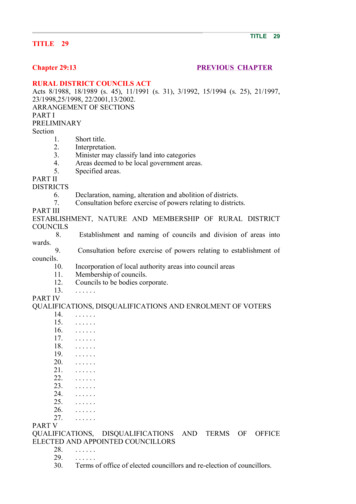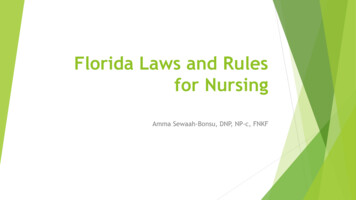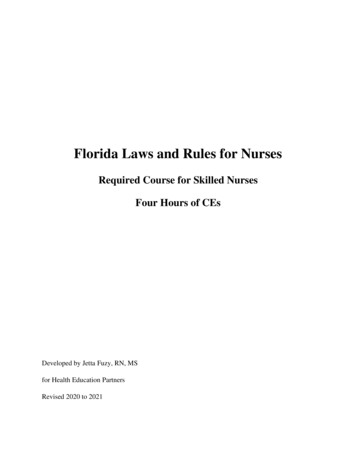
Transcription
Florida Laws and Rules for NursesRequired Course for Skilled NursesFour Hours of CEsDeveloped by Jetta Fuzy, RN, MSfor Health Education PartnersRevised 2020 to 2021
2Learning ObjectivesThis course is intended for skilled nurses in the State of Florida. Two CEs will be provided toskilled nurses who completed the test, under provider #NCE2361.Upon completion of this courses the motivated learner will be able to:1. Demonstrate an understanding of Florida Nursing Laws and Rules2. State the purpose of the Florida Nurse Practice Acts3. Describe the scope and levels of practice for skilled nurses4. Describe the scope and levels of practice for Certifies Nursing Assistants5. Define the laws and rules of the Board of Nursing, including the process of discipline for nurses6. Recite the general requirements for continuing nursing licensure in Florida7. Describe ethical and legal nursing practices8. Verbalize a professional plan for maintaining a nursing career2 Page
3OutlineI. Overview of Florida Nursing Laws and RulesII. Purpose of Florida Nurse Practice ActIII. Scope and Levels PracticeA. Related to Skilled Nurses1.RN2.LPNB. Nursing AssistantsIV. Laws and Rules of the Board of NursingA. Process of Discipline related to Nursing Practice1. Sexual Misconduct2. ViolationsB. Process of Discipline related to Nursing AssistantsV. General Requirements for Continuing Licensure in the StateVI. Ethical and Legal Practice/MalpracticeVII. Professional Plan for Career MaintenanceVIII. STATE REGULATORY CHANGES IN NURSE LICENSURE DUE TO COVID-19A. Regulations for Travel Nurses During the PandemicB. Regulations for Home Health Nurses during the Pandemic3 Page
4I. Overview of Nursing Laws and RulesFlorida Laws and Rules for Nurses is a required course for nurses in Florida every biennium at thetime of license renewal. It is a legal and moral obligation for nurses to know the laws and rulesthat govern nursing practice. This course is intended to increase the knowledge base of nursesregarding regulations pertaining to their profession and to enhance the accountability of their rolesand functions resulting in improved patient care and services.The Florida Statutes are a permanent collection of state laws organized by subject area into a codemade up of titles, chapters, parts, and sections. The Florida Statutes are updated annually by lawsthat create, amend, transfer, or repeal statutory material.General laws and rules that regulate professions and occupations in the state of Florida arecontained in Title XXXII, Chapter 456 of the Florida Statutes.Rules related to nursing in particular (including the nurse practice act), rules related to safe workpractices, and rules that protect patients from unprofessional and unsafe nursing practice arecontained in Title XXXII, Chapter 464 of the Florida Statutes. Chapter 464 has two parts: theFlorida Nurse Practice Act and rules governing certified nursing assistants.The Florida Nurse Practice Act, chapter 464 of the Florida Statues includes laws governing areassuch as scope of practice, licensure and certification, violations and penalties. It established theFlorida Board of Nursing as the authority to adopt rules, develop standards for nursing programs,and to discipline nurses who are violators of the regulations.Each state and territory of the United States, including Florida, has a law called the Nurse PracticeAct (NPA) that is enforced by the state’s nursing board. Nurses are required to understand andcomply with the laws and related rules of their own NPA in order to maintain their licenses(NCSBN, 2013a). All of the more than 300,000 registered and licensed practical nurses in Floridaare governed by and work under the Florida Nurse Practice Act (NPA).Nurses in Florida are also regulated by Chapter 456 which includes general provisions for healthprofessions, and Title 64B9 of the Florida Administrative Code.4 Page
5The Telecommunications Act of 1996, passed by the U.S. Congress, addressed the quicklyoccurring effects of developing electronics at the expanding levels of healthcare encompassingmany healthcare arenas. At that time, each state had their own guidelines for nursing certification.There were no standards to sanction nurses or protect patients in the event of harm while in a stateother that their own.The Multi-State R-Nurse Licensure Compact on January 1, 2000 was established to determine thatlaws and regulations of the state of employment govern nurses practicing in that particular statewhen working outside of their licensure state.HIPAA regulations state that the compact builds state cooperation to ensure regulation of nursingpractice.Purpose of the Florida Nurse Practice ActThe Nurse Practice Act, Chapter 464 of the Florida Statues governs the practice of RNs, LPNs,CNSs and ARNPs. It is under the Nurse Practice Act Florida Laws: FL Statue-Title XXXIIRegulation of Professionals and Occupations-Section 464.00.The purpose of the Act is to ensure that every nurse practicing in Florida meets minimum standardrequirement for safe practice and that those nurses who do not meet minimum standards shouldnot be practicing nursing in Florida.The Nurse Practice Act was legislated to safeguard the public by having laws that govern the scopeof practice, licensure, and certification, and violations and penalties. Nurses who fall belowFlorida’s minimum competency or present a danger to patients or coworkers are not permitted towork in this State.Professional nurses and licensed practical nurses are accountable to the State for decisions basedupon each nurse’s education and experience in nursing. The Act is reviewed on an annual basisby the Florida legislation. Rules and regulations of the NPA are developed by the legislation andbecome law, they are then published and made available for the public to review.5 Page
6Scope and Levels (Standards of Practice)ADNPs, CNs, and RNs are licensed to practice professional nursing with different levels ofspecialization. These nurses and licensed practical nursed are responsible and accountable formaking decisions that are based upon their educational training and nursing experience.The Florida Statues define the scope of practice of professional nursing as: The observation, assessment, nursing diagnosis, planning, intervention, and evaluation ofcare: health teaching and counseling of the ill, injured The promotion of illness, maintenance of health, and prevention of illness of others The administration of treatments and medications as prescribed or authorized by a dulylicensed practitioner authorized by the laws of this state to prescribe such medications andtreatments The supervision and teaching of other personnel in the theory and performance of any ofthe above actsClinical nurse specialist is the delivery and management of advanced practice nursing care toindividuals or groups, including the ability to: Assess the health status of individuals and families using methods appropriate to thepopulation and area of practice Diagnose human responses to actual or potential health problems Plan for health promotion, disease prevention, and therapeutic intervention in collaborationwith the patient or client Implement therapeutic interventions based on the nurse specialist’s area of expertise andwithin the scope of advanced nursing practice, including, but not limited to, direct nursingcare, counseling, teaching and collaboration with other licensed health care providersAdvanced registered nurse practitioner means any person licensed in this state to practiceprofessional nursing and is certified in advance or specialized nursing practice, including certifiednurse anesthetists, certified nurse midwives and nurse practitioners. ARNPs are required to havemalpractice insurance. They are authorized to dispense medications under the general supervision6 Page
7of a licensed physician, osteopath or dentist.LPNs are licensed to practice only under the license regulation for practical nursing within the“performance of selected acts, including the administration of treatments and medications in thecare of the ill, injured, or infirm and the promotion of wellness, maintenance of health, andprevention of illness of others under the direction of registered nurse, a licensed physician, DO,licensed podiatric physician or a licensed dentist”.The scope of nursing practice for LPNs has been expanded and specialized nursing, in certainsituations, for LPNs to participate in the limited administration of intravenous therapy based upontraining, knowledge, judgement and skill. The rule authorizes the qualified licensed practicalnurse, under direction, to perform limited forms of intravenous therapy, within the scope ofpractice for LPNs. They must pass a Board approve Intravenous Therapy Course with the learningscope to include components (topics) endorsed by the IV Therapy Course Guidelines, such as:1. Policies and Procedures of the Nurse Practice Act2. Principles of charting3. Psychological preparation and support for patients receiving IV therapy4. Site and function of the peripheral veins used for venipuncture5. Procedure for venipuncture6. Clinical manifestations of fluid and electrolyte imbalance7. Signs and symptoms of local and systemic complications8. Identification of equipment needed for IV therapy9. Formulas used to calculate fluid and drug administration rate10. Methods of administration, site assessment, flushing and blood drawing11. Compatibility or incompatibility of drugs and solutions12. Nursing management of patient receiving various IV therapies13. Central lines for IV therapy7 Page
8The aspects of IV therapy that are outside the Scope of Practice for LPNs includes: Initiation of blood and blood products Initiation or administration of cancer chemotherapy Initiation or administration of plasma expanders Initiation or administration of investigational drugs Mixing IV solutions IV pushes, except heparin flushes and saline flushesThe scope and levels of practice for Certified Nursing Assistants (CNAs) are addressed as by theBoard of Nursing states, “A certified Nursing Assistant shall provide care and assist with thefollowing related to the activities of daily living only under the general supervision of a registeredNurse or licensed practical nurse.” Authorized duties include:Those associated with personal care:1. Bathing2. Dressing3. Grooming4. Shaving5. Shampooing and caring for hair6. Providing and assisting with oral hygiene and denture care7. Caring for skin8. Caring for feet9. Caring for nails10. Providing perineal care11. Bed making and handling linens12. Maintaining a clean environment8 Page
9Tasks associated with maintaining mobility:1. Ambulating2. Transferring3. Transporting4. Positioning5. Turning6. Lifting7. Performing range of motion exercises8. Maintaining body alignmentTasks associated with nutrition and hydration:1. Feeding and assisting the resident with eating2. Assisting the resident with drinkingTasks associated with elimination:1. Toileting2. Assisting with the use of bedpan and urinal3. Proving catheter care4. Collecting specimens5. Emptying ostomy bags, or changing bags that do not adhere to the skin6. Bowel and bladder trainingTasks associated with the use of assistive devices:1. Caring for dentures, eyeglasses, contact lenses, and hearing aids2. Applying established prosthetic and orthotic devices3. Applying braces9 Page
104. Applying ant embolus stockings5. Assisting with wheelchairs, walkers, or crutches6. Using comfort devices such as pillows, cradles, footboards, wedges, and boots7. Assisting with and encouraging the use of self-help device for eating, grooming andother personal care tasks8. Utilizing and assisting residents with devices for transferring, ambulation, alignmentand positioning9. Using restraintsTasks associated with maintaining environment and resident safety, including handling of bloodand body fluid and cleaning resident care areasTasks associated with data gathering:1. Measuring temperature, pulse, respiration, and blood pressure2. Measuring height and weight3. Measuring and recording oral intake4. Measuring and recording urinary output, both voided and from urinary drainageSystems5. Measuring and recording emesis6. Measuring and recording liquid stoolOther tasks associated with resident socialization, leisure activities, reality orientation,validation techniques, end of life care, basic first aid, CPR skills, emergency care, residentrights, and documentation of services provided.In-service training requirements for CNAs includes the following guidelines:CNA must complete a minimum of 12 hours of in-service training each calendar year.10 P a g e
11Every 2 years, in-service training hours shall include, but are not limited to the followingareas:HIV/AIDS, Infection ControlDomestic ViolenceMedical Record Documentation and Legal AspectsResidents RightsCommunication with Cognitively Impaired ClientsCPR SkillsPreventing Medical Errors and SafetyCEs for CNAs are now under the Florida Nursing Board and continuing education must be offeredby an approved Provider. Providers must develop and summit courses to the Board for review andapproval before they are given approval status and a provider number that is required to be on eachcertificate of completion of CEs. Each nursing assistant must retain in-service compliance recordsfor a period of 4 years and submit records to the Board if required for auditing.Laws and Rules Related to the Practice of Nursing464.016 Violations and Penalties1. Each of the following acts constitutes a felony of the third degree: Practicing advanced or specialized, professional or practical nursing, unlessholding an active license Using or attempting to use a license or certification which has beensuspended or revoked Knowingly employing unlicensed persons in the practice of nursing Obtaining or attempting to obtain a license or certification by misleadingstatements or knowing misrepresentation11 P a g e
122. Each of the following acts constitutes a misdemeanor of the first degree: Using the name or title “Nurse”, “Registered Nurse”, “Licensed PracticalNurse”, “Clinical Nurse Specialist”, “Certified Registered NurseAnesthetist”, “Advanced Registered Nurse Practitioner” or any other nameor title which implies that a person was licensed or certified as same, unlesssuch person is duly licensed or certified. Knowingly concealing information relating to violations of this part462.017 Sexual Misconduct in the Practice of NursingThe nurse/patient relationship is founded on mutual trust. Sexual misconduct in thepractice of nursing means a violation of this relationship when the nurse uses saidrelationship to induce or attempt to induce the patient to engage, or tempt to engage thepatient in sexual activity outside the scope of generally accepted examination or treatmentof the patient. Sexual misconduct in the practice of nursing is prohibited.462.018 Disciplinary ActionsAs stated, the Board of Nursing was established to assure and protect the public from nurseswho do not meet the minimum requirements of safe nursing practice. Any violation of thelaws that do so are punishable by disciplinary action. Acts that require disciplinary or legalaction are as follows:Actions considered felonieso Practicing advanced or specialized, professional or practical nursing unless holdingan active license or certification.o Using or attempting to use a license or certification that has been suspended orrevoked.o Knowingly employing unlicensed persons in the practice of nursing.o Obtaining or attempting to obtain a license or certificate by misleading statementsor knowing misrepresentation.12 P a g e
13Actions constituting misdemeanors in the first degreeo Using the name or title that implies that a person was licensed or certified, unlesssuch a person is duly licensed or certified.o Knowingly concealing information relating to violations of this part.Actions considered grounds for denial of a license or disciplinary actiono Procuring, attempting to procure, or renewing a license to practice nursing bybribery, by misrepresentations, or through an error of the Department or the board.o Having a license to practice nursing revoked, suspended, or otherwise acted against,including the denial of licensure, by the licensing authority of another state,territory or country.o Being convicted of, or entering found guilty of, or entering a plea of nolocontendere to, regardless of adjudication, a crime in any jurisdiction that directlyrelates to the practice of nursing or the ability to practice nursing.o Being found guilty, regardless of adjudication, of any of the following offences:1. A forcible felony2. Theft, robbery and related crimes3. Fraudulent practices4. Lewdness and indecent exposure5. Assault, battery, and culpable negligence6. Child abuse, abandonment, and neglect7. Abuse, neglect and exploitationo Making or filing a false report or record, intentionally or negligently failing to filea report or record required by state or federal law, or willfully impeding orobstructing such a filing or inducing another person to do so.o False, misleading, or deceptive advertisingo Unprofessional conducto Engaging or attempting to engage in the possession, sale, or distribution ofcontrolled substances for any other than legitimate purpose13 P a g e
14General Requirements for Continuing Licensure in the StateEvery nurse in Florida must renew his or her license and complete the required continuingeducation every two years. One hour of continuing education is required for each calendar monthof the biennium totaling 24 hours. As part of this 24-hour mandate, the following courses arerequired: An approved two-hour course on the prevention of medical errors An approved course on the laws and rules that govern the practice of nursing in Florida Every third renewal, a two-hour course on Domestic Violence A course on HIV/AIDS must be completed prior to a licensee’s first renewalA licensee must retain certificates and/or any other documentation of the requirement for a periodof four years. The Board has the right to randomly audit any nurse to ensure the continuingeducation requirements are met.Failure to have documentation of proof of the requirements or having misleading information mayresult in disciplinary action by the Board. A license that is not renewed properly at the renewaltime, will be automatically become delinquent.All licensees must keep the Board informed of a change in address and/or a change in their currentplace of practice.Ethical and Legal PracticeEthical issues are referred to as ethics of caring because the ANA has established the Code ofEthics or Nurses. Ethics follow the rules of conduct generally accepted by the nursing profession.The full text is available at here.Examples of ethical issues that may occur are often related to patient-entered care, advocacy,delegation and generally supporting the profession:Access to medical careInformed consentConfidentiality and exceptions to confidentialityMandatory reporting14 P a g e
15Mandatory drug testingPrivileged communication with healthcare providersAdvance directivesReproductive rights/abortionPhysician-assisted suicideLegal issues that may affect nursing practice have specific laws behind them. Such laws pertainto documentation, licensure, and standards of care. The laws are instituted to hold nursesaccountable for maintaining an acceptable standard of patient care.Working through an ethical dilemma until a satisfactory conclusion is reached, making decisionsthat lead to good actions, and avoiding negative consequences and regret are the foundationalprinciples of ethical practice (Noel-Weiss et al., 2012).Malpractice consists of the following four elements that must be met to substantiate a claim ofnursing malpractice:1. Duty: The nurse was duty bound to meet a specific standard of care2. Breach of duty: The nurse failed to perform the duty3. Causation: There is a causal connection between the nurse’s failure and the patient’s injury4. Damages: An injury occurred for which monetary compensation is adequate reliefThe common categories of Malpractice are:Failure to asses and monitorFailure to follow standards of careFailure to use equipment in a responsible mannerFailure to documentFailure to act as a patient advocateThe common term used by the malpractice insurance companies is “compensable event” whichrefers to any event that entitles someone to monetary compensation. Malpractice cases arecompensable events. Many cases are settled out of court and never even filed for going to trial.15 P a g e
16Some of the common events involving RNs include patient falls, IV therapy and medication errors,skin breakdown, and failures in monitoring.Medical cases of criminal negligence occur when a health care person takes a considerable riskwith the patient’s safety and/or welfare. The criminal system determines whether or not the eventdemonstrates criminal misconduct because the health care person failed to provide adequatemedical care resulting in significant danger or harm to the patient’s mental or physical health.Some crimes involving nurses include:o Assault and batteryoDrug possessiono Any form of abuseo Breach of privacyHIPAA is the Health Insurance Portability and Accountability Act of 1996. This law addressesprocedures for obtaining, storing and transmitting patient medical information to ensure privacyand confidentiality are observed. Protected health information (PHI) includes:The patient’s past, present or future physical or mental health conditionThe provision of health care to the patientPast, present or future payment for health care provisionProtection of the identity of the patientProtection of identifiable health information such as name, address, birth date orsocial security number.Nurses can lower their risk for potential liability by practicing within the boundaries of his or herprofessional license, knowing the laws and nurse practice standards. And purchasing malpracticeinsurance.Professional Plan for Career MaintenanceEach skilled nurse should have a professional plan to managed and maintain his or her nursingcareer. Firstly, keep in touch with laws and remain updated on Florida Statues and changes.Secondly, join professional organizations that will be useful to your specialty in nursing. Lastly,16 P a g e
17keep learning by taking courses and choosing continuing education courses that, not only meet theState requirements, but also provide useful information to improve his or her career choices.If nurses have a career plan, they must include goals such as furthering their education andobtaining credentials to improve upon skills. They should update their resumes consistently sowhen opportunities arise, they are ready for that important interview.Nurses should keep abreast of current changes in healthcare and stay up to date on new technologythat could enhance documentation in this time of paperless documentation. Document carefullywhat procedures are provided and especially how the patients respond to interventions.Complaints against nurses have increased. In 2012 the National Council of State Boards of Nursingreported that in Florida 55 licensed nurses were placed on probation, 440 had their licensessuspended, and 78 had their licenses revoked (NCSBN, 2013a).Corona Regulations for Skilled NursesStates Changing Nurse Licensing for COVID-19 ResponseTRAVEL NURSES CAN WORK ACROSS STATE LINES FASTER THAN EVER BEFOREUpdated as of April 25, 2020Editor’s note: Please visit the following resources for ongoing updates:National Council of State Boards of Nursing, Inc.National Council of State Boards of Nursing (NCSBN) COVID-19 site.Amid the current Coronavirus 2020 (COVID-19) pandemic, federal and state governments areworking together to ensure that healthcare providers are available to help patients in the areas thatare hardest hit. That includes bringing in travel nurses across state lines when necessary.To that end, governors are allowing their state boards of nursing to temporarily change theirlicensing restrictions and slash the time normally needed to apply and be approved for crisisresponse nursing jobs. We’ve pulled together some important information about these changes innurse licensing.17 P a g e
18VERIFYING CURRENT NURSING LICENSESCurrent and prospective travel nurses that work with AMN Healthcare’s travel nursing partnerscan get help from their recruitment team to verify all the states where they hold a valid license topractice. In addition, they can use NCSBN’s national Nursys online database or the state boardsites to quickly check their nurse licensure.Nurses who already hold a multistate nursing license as part of the Nurse Licensure Compact(NLC) can quickly get to work in more than 30 states that participate in the compact.STATE REGULATORY CHANGES IN NURSE LICENSURE DUE TO COVID-19The majority of states have announced they are temporarily changing certain requirements thatwill affect nurses practicing in their states, due to the impact of the coronavirus on their healthcareworkforce. Every state, territory, and the District of Columbia has now declared a state ofemergency, allowing nurses licensed in other states to be fast-tracked for practice.Here are some changes being enacted at states with high needs for travel nurses*:Alabama. Because of the current state of emergency, you can practice nursing in Alabama for upto 30 days if you have a valid nursing license in another state and your employer can verify thatlicense. After 30 days, you will need to apply for a temporary permit to practice for another 90days.Alaska. The state of Alaska is granting 30-day non-renewable licenses for telehealth in emergencyservices to anyone with an Alaska nursing license (including RNs, LPNs, and APRNs).California. The state’s Emergency Medical Services Authority issued a proclamation on March24 stating that licensed medical personnel from other states who enter California “to assist inpreparing for, responding to, mitigating the effects of and recovering from COVID-19 shall bepermitted to provide services in the same manner as prescribed in Government Code section 179.5,with respect to licensing and certification.” The EMS Authority will only accept requests for outof-state medical personnel approval from a California medical facility, telehealth agencycontracted with a California medical facility or a staffing agency providing staffing to Californiamedical facilities. CA EMSA Out of State Approval Request Form.Colorado. The Colorado Department of Regulatory Agencies is working to increase the numberof nurses available to provide care by adjusting licensure requirements. If you have a license topractice in another state, they are expediting the process to get licensed in Colorado. Moreinformation about emergency measures will be released soon.Georgia. You can apply for a temporary nursing license to practice in Georgia as an advancedpractice registered nurse, licensed practical nurse, or registered nurse, according to recentadjustments by the Georgia Board of Nursing. The board is waiving the application fee.Louisiana. You can apply to the Louisiana State Board of Nursing for an emergency temporarypermit that will remain valid for 60 days as long as you hold a current unrestricted license inanother state, can provide valid ID and a copy of professional license to the board to be used forverification.18 P a g e
19Maryland. If your Maryland nursing license is scheduled to expire during the current state ofemergency, you will be granted an extension. Your license’s expiration date will be extended tothe 30th day after the state of emergency ends.Massachusetts. Massachusetts Board of Registration in Nursing will expedite the processing ofreciprocal license applications for nurses who are licensed in another jurisdiction. All fullycompleted applications with documents and fees will be processed within one business day.New Hampshire. Out-of-state nurses who intend to work in NH to assist with the COVID-19response, should complete an application for emergency license and submit verification oflicensure. NH will issue a single state emergency temporary license.New Jersey. Under the regulatory waivers, individuals who hold current healthcare licenses andcertifications in good standing in other jurisdictions, and have been practicing within the last fiveyears, will be able to secure NJ licenses by completing a simple form. DCA intends to grantapplications within hours of receiving the form.New York. Currently, pursuant to Executive Orders, out-of-state licensed physicians, registeredprofessional nurses, licensed practical nurses, nurse practitioners, and respiratorytherapists do not need to hold a NYS license or registration to practice in the State of New York.All other NYS licensed professionals are required to be licensed in the State of New York in orderto practice.North Carolina. North Carolina is allowing a temporary waiver of state licensure requirementsfor healthcare and behavioral health personnel who are licensed in another territory or the Districtof Columbia to provide healthcare services within the "Emergency Area."North Dakota. North Dakota has temporarily suspended licensure requirements for healthcareprofessionals, including registered nurses, licensed practical nurses and APRNs.Ohio. The Ohio State Board of Nursing has activated an expedited process for reviewing andgranting temporary licenses to nurses from other states who hold valid, current unencumberedlicenses. Once you receive a temporary license, you should be able to practice within five businessdays–or fewer, if the board receives an application for reciprocity.Oregon. Update: The Oregon State Board of Nursing is now asking nurses and nursing assistantswho want to work in the state during the current coronavirus crisis to apply for e
(NCSBN, 2013a). All of the more than 300,000 registered and licensed practical nurses in Florida are governed by and work under the Florida Nurse Practice Act (NPA). Nurses in Florida are also regulated by Chapter 456 which includes general provisions for health professions, and Title 64B9 of the Florida Administrative Code.

